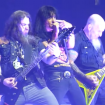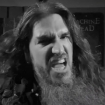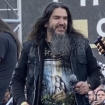Robb Flynn vividly remembers his first exposure to rock-and-roll music. "When I was a kid, a friend of mine bought three records: AC/DC's Back in Black, Devo's Q: Are We Not Men? A: We Are Devo, and Van Halen," he recalls. "And when I heard Eddie Van Halen play the riff from 'You Really Got Me,' that was it for me. I had never heard a sound that heavy before. I was like, 'Fuck, I wanna play guitar!'"
Flynn did soon pick up an ax, and in the mid-'80s made his first mark on metal as founding guitarist of Bay Area thrashers Forbidden. After a stint with another lauded Bay Area band, Vio-lence, the now 44-year-old singer-guitarist stepped into the frontman role with Machine Head, who today are one of the pillars of modern metal. Over the course of 20 years and seven studio albums, the band has built an impressive catalog and a rabid fan base. So rabid, in fact, that their fans proved instrumental in helping to title the band's new live album, Machine Fucking Head Live. "We called it that because it's what we hear in between every single song," Flynn explains. "Whenever we stop playing, it's [chants] 'Machine fuckin' Head! Machine fuckin' Head!' You can probably hear it about 150 times on the record."
It's understandable why their fans would be so excitable: Machine Head's recent albums, in particular 2007's The Blackening and 2011's Unto the Locust, are regarded by many as among their strongest and most aggressive work in years. According to Flynn, it seemed like the right time to document this period in the band's career with a live recording. "We put out a live album back in 2003 [Hellalive] that chronicled our first four records," he says. "And then we put out the live DVD Elegies that covered [2003's] Through the Ashes of Empires. But we hadn't done anything to capture The Blackening or Unto the Locust. We had been recording some of the shows on our recent headline tour both overseas and here in the States, and the gigs were so freakin' awesome. The crowds were losing it. So we were like, 'Let's do this.'"
Flynn displays a similar go-for-it attitude when it comes to taking part in the Revolver mailbag. "I'm happy to do it," he says. "And thanks to all the fans who took the time to send in questions."
Even the stupid ones? He laughs. "Yeah, even the stupid ones. Bring it on!"
It must have been awesome to be grow up in the Bay Area in the early '80s and watch thrash come into existence firsthand. What do you remember about that time? —Greg Teal
I was 14, 15 year old and just starting to go to club shows, and looking back it was such an incredible time. I don't think anybody realized it then but we were witnessing the birth of a movement that would go on to change music. It's amazing when you think of all the acts that were coming up—Metallica and Exodus on the thrash side, and bands like Possessed, who were laying the groundwork for what would become death metal. And there was a point where hardcore bands started paying with metal bands, which was very cool: GBH would play with Death Angel, Suicidal Tendencies would play with Vio-lence. Another thing I remember was that it was a fucking lawless time. Shows were so violent and brutal. Security would be, like, one guy at the front door. One of the first shows I went to, the guitar player in the band jumped off the stage and just punched the dude right in front of me. So you definitely had to learn the wolves from the sheep. But it was an awesome period of time. I was just fortunate to live in the right area.
I've heard that you left Vio-lence to form Machine Head because of a fight involving the band and a local gang. What happened?—Nicholas Grant
I was with some buddies and we got jumped by 15 dudes that were part of a gang called the Flower Part Gang. Trust me, the name didn't do them justice. [Laughs] It was a pretty intense deal. And we had a show two days later and they were threatening to throw grenades onstage. They were calling the club and saying they were gonna do it. And you know, it sounds like a pretty outlandish claim but it wasn't something to take lightly. I had already started Machine Head by that time—it was like an ongoing side project. So I ended up leaving Vio-lence. I basically told them I wasn't going to do the show. That was the impetus I needed to start my own trip.
"Aesthetics of Hate" off The Blackening is one of my favorite Machine Head songs. I read that it was inspired by an article some idiot wrote insulting Dimebag after his murder. Is that true?—Britney Stoddart
It is. That whole time period in the wake of Dime's murder was stunning. Machine Head had toured with Pantera twice—once on Ozzfest and then for their Official Live: 101 Proof album. So I got to know Dime. We weren't best friends, but he was certainly a friend. And to read this hideous article [titled "Aesthetics of Hate: R.I.P. Dimebag Abbott, and Good Riddance," by William Grim] that came out maybe four days after he was murdered, it was disgusting. It was infuriating. I simmered on that for a long time. I wrote a blog about it, like an online diary sort of thing. And one of the things I said was, "You will burn in hell." And it just kind of went from there. That song was a pretty Neanderthal burst of anger and it felt really good.
In light of the band's full-on metal resurgence with your awesome last three albums, how do you look back on a song like "From This Day," from The Burning Red, where you're rapping, and dressed all crazy in the video?—Chuck Morales
I'm super proud of it. I love that song. A lot of people love that song. There's this myth in the media that our fans abandoned us on those two records [The Burning Red and Supercharger], and it's repeated over and over in every article I read. But the fact is that when we play songs off those albums, when we play "The Blood, the Sweat, the Tears," or when we play "Bulldozer," people lose their fucking marbles, man. People go crazy. And you know, we make a point when we headline to do those songs, basically as a way to stick our middle fingers up to every one of those fucking haters, every one of those fucking assholes, and say, "Fuck you!" Now, as far as the way I looked back then, we've all made a fashion faux pas. [Laughs] I watch that video and I'm like, "What's with all the fucking orange?!" But fuck it. It was 13 years ago. In the pantheon of rock-and-roll moves, it was definitely one of the misdemeanors.
Why did Roadrunner drop you after Supercharger?—Robert Jarnow
That's another part of the myth that I hear literally every fucking interview that I do. What seems to be misconstrued is this—we didn't get dropped from Roadrunner. We demanded to be let go. I actually wrote a letter to the label, with Adam [Duce, Machine Head bassist] sitting there with me, demanding it. We said, "We're not going to make more music for you. You guys fucked us. Let us go or there's gonna be serious consequences." And they did let us go. We had signed a pretty crummy deal in the early '90s—we had to give up our merchandising, give up our publishing. We were just so in debt that there was no chance of ever getting out of it. So there was a lot of shit that was fucked up about that. Somehow that got turned around into this story that we got dropped and everybody hated us.
During the period after Supercharger when you didn't have a record label, did it feel like you were starting over from scratch?—Mike Bradley
If anything, it made us take a long look at what we wanted to do and how we wanted to do it. When I listen to [2003's] Through the Ashes of Empires, it's one big, giant "Fuck you" to everybody. That's what "Imperium" is. Because people doubted us. People fucking blacklisted us. We couldn't even get any interviews. So we went about redoing our whole way that we approach music and business. We got really active online and started reaching out to our fans directly. We had submitted the songs that were on Through the Ashes of Empires to 35 labels in America and got turned down by every one. Then we put the album out in Europe and it exploded. And after it blew up in Europe, all those labels then came back and said, "Let's talk about this record…" In the end, Roadrunner wanted to release it here and we worked out a pretty fair deal.
I'm adopted and I know that you're adopted, too. How has that experience affected you?—Bailey Wright
I actually wrote a song about it on Through the Ashes of Empires called "Left Unfinished." That pretty much details my thoughts on what went down. One thing I can say is that in a sense I've always felt a disconnect from people. Even simple questions become complicated, like when you're a kid in school and you're asked, "Is there a history of cancer in your family?" I don't know. I don't know my family. But I was adopted when I was six months old so I feel really fortunate about that. I had gone through three different foster homes at that point in my life and some people never get out of that. I was lucky to be picked up by my mom and dad who raised me. So I feel blessed. A lot of people had it way worse than I did. But what do you do? You persevere and you forge your own path. Life is tough but lots of people have had it tougher than me. You eat nails and get on with it.
What's the best concert you've ever attended?—Patrycja Cholewińska
I can think of three right off the top of my head. The first is Slayer on the Seasons in the Abyss tour. It was January 14, 1991, just days before Desert Storm. Eight thousand people at the Henry J. Kaiser Center in Oakland. The vibe in there was so fucking maniacal. It was on the edge of riot. When they busted out "War Ensemble" and got to that part in the middle where Tom [Araya, Slayer frontman] screams "Waaaaaaar!," even now just thinking about it, I get goose bumps. It was fucking intense with everybody singing it and everybody knowing what was about to happen. It was one of the most savage shows I've ever seen. Another show that comes to mind is Muse when they toured behind Black Holes and Revelations and played in the Bay Area. That was pretty mind-boggling. And also when Roger Waters performed The Wall a few years back. That was amazing. It just hit every emotion possible. It made me angry, it made me horny, it made me happy, it made me sad. It was a life-changing show for me.
Do you still have beef with Limp Bizkit from when you guys argued about lineup slots at Sonisphere a few years back?—Joey Ruiz
Nah. We've done a bunch of festivals with them and Wes [Borland, Limp Bizkit guitarist] came up to me and we talked it out. He was like, "Dude, I'm super sorry. Our DJ was being a douchebag." He's a cool dude. Killer guitar player and such a freak. We squashed it.
Have you ever shit your pants onstage? —Jimmy Cantu
The answer is yes! In Denver on the Sounds of the Underground tour in 2006. I don't know what the fuck happened but Phil [Demmel, Machine Head guitarist] and I both ate some fucked-up food and got food poisoning. I was vomiting the whole show. And I remember at the beginning of "Davidian," I went and threw up on the side of the stage. And as I was coming back, I just fucking farted, and it was lumpy. [Laughs] Things were brutal for, like, 12 hours. We had one bathroom in our dressing room and every five minutes either I was in there or Phil was in there. It was fucking disgusting. He'd go in with diarrhea, and then I'd have to go in and throw up. And you're sticking your face right in that same bowl. It was gnarly.
Titties or beer?—Katie K. Stroballz
Why does it have to be one or the other? Titties and beer.












